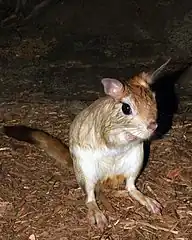| Pedetidae | |||||
| J.E. Gray, 1825[1] | |||||
 Przedstawiciel rodziny – postrzałka kafryjska (P. capensis) | |||||
| Systematyka | |||||
| Domena | |||||
|---|---|---|---|---|---|
| Królestwo | |||||
| Typ | |||||
| Podtyp | |||||
| Nadgromada | |||||
| Gromada | |||||
| Infragromada | |||||
| Rząd | |||||
| Podrząd | |||||
| Infrarząd | |||||
| Rodzina |
postrzałkowate | ||||
| Typ nomenklatoryczny | |||||
|
Pedetes Illiger, 1811 | |||||
| |||||
| Rodzaje | |||||
| |||||
Postrzałkowate[13], postrzałki[14] (Pedetidae) – rodzina ssaków z infrarzędu wiewiórolotkowych (Anomaluromorphi) w obrębie rzędu gryzoni (Rodentia).
Zasięg występowania
Podział systematyczny
Do rodziny należy jeden występujący współcześnie rodzaj[17][15][13]:
- Pedetes Illiger, 1811 – postrzałka
Opisano również rodzaje wymarłe:
Uwagi
Przypisy
- 1 2 J.E. Gray. An Outline of an Attempt at the Disposition of Mammalia into Tribes and Families, with a List of the Genera apparently appertaining to each Tribe. „Annals of Philosophy”. New Series. 10, s. 342, 1825. (ang.).
- ↑ J.E. Gray. On the Natural Arrangment of Vertebrose Animals. „The London Medical Repository”. 15, s. 303, 1821. (ang.).
- ↑ R. Owen: Mammalia. W: R.B. Todd (red.): The cyclopædia of anatomy and physiology. Cz. 3. London: Sherwood, Gilbert, & Piper, 1839–1847, s. 242. (ang.).
- ↑ Mammifères. W: C.-D. Degland: Catalogue du Muséum d’histoire naturelle de la ville de Lille. Cz. 1. Lille: Imprimerie de L. Danel, 1854, s. 98. (fr.).
- ↑ J.Ch. Chenu: Encyclopédie d’histoire naturelle; ou, traité complet de cette science d’après les travaux des naturalistes les plus éminents de tous les pays et de toutes les époques: Buffon, Daubenton, Lacépède, G. Cuvier, F. Cuvier, Geoffroy Saint-Hilaire, Latreille, De Jussieu, Brongniart, etc.. Cz. 10: Rongeurs et pachydermes. Paris: Maresq, 1851–1860, s. 161. (fr.).
- ↑ J.F. von Brandt. Beiträge zur nähern Kenntniss der Säugethiere Russland’s. 5. Abhandlung: Unlersuchungen uber die craniologischen Entwickelungsstufen und die davon herzuleiteten Yerwandtschaften und Classificationen der Nager der Jetztzeit, mit besonderer Beziehung auf die Gattung Castor. 2. Theil: Craniologische Charakteristik der einzeluen Nagergruppen. „Mémoires de l’Académie impériale des sciences de St.-Pétersbourg”. 6e série. Seconde partie. Sciences naturelles. 7 (2), s. 219, 1855. (niem.).
- ↑ J.V. Carus: Handbuch der Zoologie. Cz. 1: Wirbelthiere, Mollusken und Molluscoiden. Leipzig: Wilhelm Engelmann, 1868, s. 101. (niem.).
- ↑ E.R. Alston. On the classification of the order Glires. „Proceedings of the Zoological Society of London”. 1876 (1), s. 90, 1876. (ang.).
- ↑ H. Winge: Pattedyr-Slægter. T. 2: Rodentia, Carnivora, Primates. Kobenhavn: Hagerup, 1924, s. 20. (duń.).
- ↑ J.R. Ellerman: The families and genera of living rodents. Cz. 1: Family Muridae. London: British Museum, 1941, s. 33. (ang.).
- 1 2 D.G. MacInnes. A new Miocene rodent from East Africa. „Fossil Mammals of Africa”. 12, s. 1, 1957. (ang.).
- ↑ R. Lavocat. Les rongeurs du Miocène d’Afrique Orientale. Miocène inférieur. „Memoires et Travaux de l’Institut de Montpellier de l’Ecole Pratique des Hautes Etudes”. 1, s. 197, 1973. (fr.).
- 1 2 Nazwy polskie za: W. Cichocki, A. Ważna, J. Cichocki, E. Rajska-Jurgiel, A. Jasiński & W. Bogdanowicz: Polskie nazewnictwo ssaków świata. Warszawa: Muzeum i Instytut Zoologii PAN, 2015, s. 285. ISBN 978-83-88147-15-9. (pol. • ang.).
- ↑ Zygmunt Kraczkiewicz: SSAKI. Wrocław: Polskie Towarzystwo Zoologiczne - Komisja Nazewnictwa Zwierząt Kręgowych, 1968, s. 81, seria: Polskie nazewnictwo zoologiczne.
- 1 2 C.J. Burgin, D.E. Wilson, R.A. Mittermeier, A.B. Rylands, T.E. Lacher & W. Sechrest: Illustrated Checklist of the Mammals of the World. Cz. 1: Monotremata to Rodentia. Barcelona: Lynx Edicions, 2020, s. 314. ISBN 978-84-16728-34-3. (ang.).
- ↑ D.E. Wilson & D.M. Reeder (red. red.): Pedetes. [w:] Mammal Species of the World. A Taxonomic and Geographic Reference (Wyd. 3) [on-line]. Johns Hopkins University Press, 2005. [dostęp 2019-10-05].
- ↑ N. Upham, C. Burgin, J. Widness, M. Becker, C. Parker, S. Liphardt, I. Rochon & D. Huckaby: Treeview of Mammalian Taxonomy Hierarchy. [w:] ASM Mammal Diversity Database (Version 1.11) [on-line]. American Society of Mammalogists. [dostęp 2023-09-29]. (ang.).
- ↑ Pickford i Mein 2011 ↓, s. 463.
- ↑ P. Mein & M. Pickford. Early Miocene Rodentia from the northern Sperrgebiet, Namibia. „Memoir of the Geological Survey of Namibia”. 20, s. 242, 2008. (ang.).
- ↑ Pickford i Mein 2011 ↓, s. 460.
Bibliografia
- M. Pickford & P. Mein. New Pedetidae (Rodentia: Mammalia) from the Mio-Pliocene of Africa. „Estudios Geológicos”. 67 (2), s. 455–469, 2012. DOI: 10.3989/egeol.40714.202. (ang.).
This article is issued from Wikipedia. The text is licensed under Creative Commons - Attribution - Sharealike. Additional terms may apply for the media files.